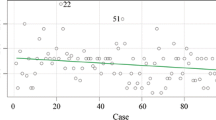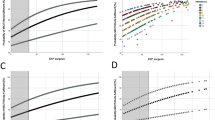Abstract
Purpose
To describe and validate a novel modular training scheme (MTS) for trans-peritoneal laparoscopic nephrectomy (LN) and retroperitoneoscopic nephrectomy (RN).
Methods
Four consultant urologists attended a Masterclass in “Advanced Laparoscopic and Robotic Surgery,” certified by the University of Turin (IT). The Masterclass was based on a supervised MTS, which involved progressive, proficiency-based training through nine and seven steps for LN and RN, respectively. After becoming proficient in all the steps, each trainee performed a minimum of five procedures as first operator under direct observation of the mentor in the training centre. Then, each trainee independently performed 10 LN and 10 RN at his home institution. The surgical outcomes were compared with those from a contemporary series of procedures performed by the mentor.
Results
All trainees successfully completed the 12-week MTS program. Median number of training cases to become competent in trans-peritoneal LN and RN was 13.0 (IQR 11.5–20.5) and 23.5 (IQR 19.5–32.0), respectively. A significantly higher rate of conversion to open surgery was observed for RNs independently performed by the trainees in their hospital compared to the mentor (p = 0.033). Failure to progress due to difficult anatomical orientation and abdominal wall bleeding during dissection of retroperitoneal space were the most frequent reasons of conversion.
Conclusions
A 12-week intensive modular program allows to achieve proficiency in performing independently LN and a RN after a median of 13 and 23.5 cases, respectively. Therefore, these procedures can be safely introduced and implemented in clinical practice within a relatively short time.
Similar content being viewed by others
References
Autorino R, Haber GP, Stein RJ et al (2010) Laparoscopic training in urology: critical analysis of current evidence. J Endourol 24:1377–1390
Brewin J, Ahmed K, Challacombe B (2014) An update and review of simulation in urological training. Int J Surg 12:103–108
van der Poel H, Brinkman W, van Cleynenbreugel B et al (2016) Training in minimally invasive surgery in urology: European Association of Urology/International Consultation of Urological Diseases consultation. BJU Int 117:515–530
Zendejas B, Brydges R, Hamstra SJ, Cook DA (2013) State of the evidence on simulation-based training for laparoscopic surgery: a systematic review. Ann Surg 257:586–593
Nagendran M, Toon CD, Davidson BR, Gurusamy KS (2014) Virtual reality training for surgical trainees in laparoscopic surgery. Cochrane Database Syst Rev 17(1):CD010479
Gurusamy KS, Nagendran M, Toon CD, Davidson BR (2014) Laparoscopic surgical box model training for surgical trainees with limited prior laparoscopic experience. Cochrane Database Syst Rev 1(3):CD010478
Stolzemburg J, Truss M, Rabenalt R et al (2007) Training in laparoscopy. Eur Urol (EAU-EBU Update Series) 5:53–62
Kolla SB, Gamboa AJ, Li R et al (2010) Impact of a laparoscopic renal surgery mini-fellowship program on postgraduate urologist practice patterns at 3-year followup. J Urol 184:2089–2093
Corica FA, Boker JR, Chou DS et al (2006) Short-term impact of a laparoscopic “mini-residency” experience on postgraduate urologists’ practice patterns. J Am Coll Surg 203:692–698
Stolzemburg JU, Schwaibold H, Bhanot SM et al (2005) Modular surgical training for endoscopic extraperitoneal radical prostatectomy. BJU Int 96:1022–1027
Frede T, Erdogru T, Zukosky D et al (2005) Comparison of training modalities for performing laparoscopic radical prostatectomy: experience with 1,000 patients. J Urol 174:673–678
Stewart GD, Phipps S, Little B et al (2012) Description and validation of a modular training system for laparoscopic nephrectomy. J Endourol 26:1512–1517
Keeley FX Jr, Timoney AG, Ranè A et al (2009) Mentorship in urological laparoscopic surgery: lessons learned. BJU Int 103:1111–1113
Ljungberg B, Bensalah K, Canfield S et al (2015) EAU guidelines on renal cell carcinoma: 2014 update. Eur Urol 67:913–924
Guillonneau B, Abbou CC, Doublet JD et al (2001) Proposal for a “European scoring system for laparoscopic operations in urology. Eur Urol 40:2–6
Volpe A, Ahmed K, Dasgupta P et al (2015) Pilot validation of the European association of urology robotic training curriculum. Eur Urol 68:292–299
Hay D, Khan MS, Van Poppel H et al (2015) Current status and effectiveness of mentorship programmes in urology: a systematic review. BJU Int 116:487–494
Laguna MP, Schreuders LC, Rasswailer CC et al (2005) Development of laparoscopic surgery and training facilities in Europe: results of a survey of the European Society of Uro-Technology (ESUT). Eur Urol 47:346–351
Brinkman WM, Tjiam IM, Schout B et al (2014) Results of the European basic laparoscopic urological skills examination. Eur Urol 65:490–496
Furriel FT, Laguna MP, Figueiredo AJ, Nunes PT, Rassweiler JJ (2013) Training of European urology residents in laparoscopy: results of a pan-European survey. BJU Int 112:1223–1228
Peters JH, Fried GM, Swantrom LL et al (2004) Development and validation of a comprehensive program of education and assessment of the basic fundamentals of laparoscopic surgery. Surgery 135:21–27
Author’s contribution
Protocol/project development were done by Cantiello F, Porpiglia F. Data collection or management were performed by Cantiello F, Bertolo R, Fiori C and Cicione A. Data analysis were done by Cantiello F, Veneziano D and Cicione A. Manuscript writing/editing were done by Cantiello F, Porpiglia F. Supervision was done by Autorino R, Damiano R, Porpiglia F.
Author information
Authors and Affiliations
Corresponding author
Ethics declarations
Ethical standard
The ethics committee of University of Turin approved this study. All patients were given their informed consent prior to their inclusion in the study. This article contains no personal information of any patients enrolled.
Conflict of interest
Each author declares no conflict of interest.
Rights and permissions
About this article
Cite this article
Cantiello, F., Veneziano, D., Bertolo, R. et al. Safe introduction of laparoscopic and retroperitoneoscopic nephrectomy in clinical practice: impact of a modular training program. World J Urol 35, 761–769 (2017). https://doi.org/10.1007/s00345-016-1921-4
Received:
Accepted:
Published:
Issue Date:
DOI: https://doi.org/10.1007/s00345-016-1921-4




